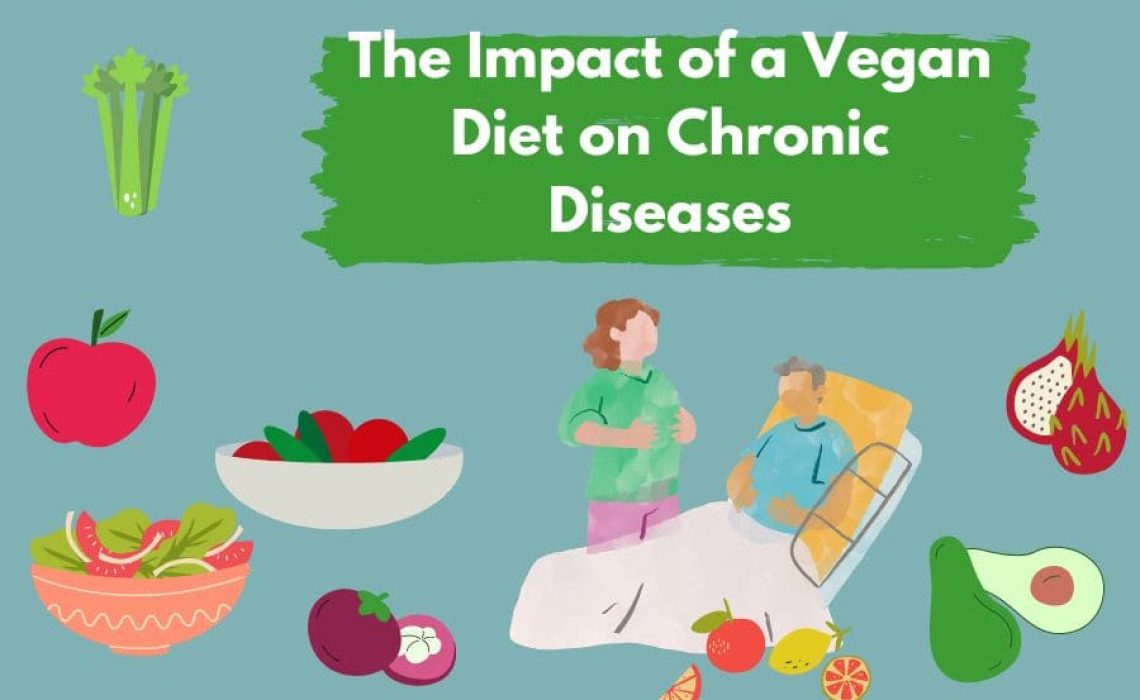Vegan Diet on Chronic Diseases: In recent years, a growing interest in personal health, sustainability, and animal welfare has led to the rise of various dietary movements. One such movement is veganism, which has been gaining recognition not only as a lifestyle choice but also for its potential health benefits. On the other hand, chronic diseases, such as heart disease, diabetes, cancer, and obesity, pose a significant health concern worldwide. These conditions are often influenced by lifestyle factors, particularly diet.
This blog post aims to explore the impact of a vegan diet on chronic diseases. To provide an in-depth understanding, we will delve into the principles of veganism, discuss the nature of chronic diseases, and examine the scientific evidence linking a vegan diet with these conditions. The goal is not to advocate or discredit a specific dietary approach but to present balanced, research-backed insights to enable informed decisions about diet and health.
Table of Contents
Toggle1. Understanding the Vegan Diet
A. Definition of Veganism
Veganism is a lifestyle and dietary choice that excludes the consumption and use of all animal products. Individuals who practice veganism, known as vegans, avoid meat, fish, dairy, eggs, and other food products derived from animals.
B. Types of Food in a Vegan Diet
A well-planned vegan diet encompasses a wide variety of foods. These include fruits, vegetables, grains, legumes (beans, lentils, peas), nuts and seeds, tofu, and plant-based milk alternatives. Many processed foods, sweets, and snacks are also vegan-friendly, although they may not always be healthful.
C. Essential Nutrients in a Vegan Diet
Despite excluding animal-derived products, a balanced vegan diet can provide the most essential nutrients. These include dietary fibre, vitamins (such as A, C, and E), and minerals like potassium and magnesium. However, nutrients like vitamin B12, iron, omega-3 fatty acids, and protein require more attention in a vegan diet, as they are predominantly found in animal products.
D. Misconceptions about the Vegan Diet
Many misconceptions surround the vegan diet, such as it being inherently healthy or providing insufficient protein. While a vegan diet can be healthful and balanced, it’s crucial to note that it requires careful planning, just like any other diet. Regarding protein, several plant-based sources such as lentils, tofu, tempeh, and quinoa can contribute significantly to meeting daily protein needs.
2. Chronic Diseases and Their Common Causes
A. Explanation of Common Chronic Diseases
Chronic diseases are long-term health conditions that can progress slowly and persist for a long time. Some of the most common chronic diseases include:
- Heart Disease: It is primarily a result of atherosclerosis – a condition where the arteries become narrowed due to plaque buildup, which can lead to heart attacks and stroke.
- Diabetes: It’s a condition characterized by high blood sugar levels over a prolonged period. Type 2 diabetes is often associated with obesity and lifestyle factors, while type 1 diabetes is an autoimmune condition.
- Cancer: This refers to a group of diseases characterized by abnormal cell growth with the potential to spread to other parts of the body. There are many types of cancer, including breast cancer, lung cancer, and colorectal cancer.
- Obesity: This is a medical condition characterized by excess body fat. Obesity increases the risk of various health problems, including heart disease, diabetes, and certain types of cancer.
B. Common Causes and Risk Factors for These Diseases
These diseases often share common risk factors, many of which are related to lifestyle choices. These include poor diet, lack of physical activity, tobacco use, and excessive alcohol consumption. Additionally, factors such as genetics, age, and environmental factors can also play a role.
C. The Role of Diet in Chronic Diseases
Diet plays a critical role in the development and management of chronic diseases. Diets high in saturated and trans fats, salt, and sugar have been associated with an increased risk of various chronic diseases. Conversely, diets rich in fruits, vegetables, whole grains, and lean proteins can contribute to the prevention and management of these diseases.
3. The Science Behind the Vegan Diet and Chronic Diseases
A. Review of Studies Linking a Vegan Diet to Reduced Risk of Chronic Diseases
Numerous scientific studies suggest that a vegan diet may have significant health benefits, particularly in relation to chronic diseases. A meta-analysis published in the Journal of the American Heart Association, for instance, found that plant-based diets, including vegan diets, were associated with a lower risk of cardiovascular disease.
B. Detailed Look at How a Vegan Diet Impacts Specific Chronic Diseases
- Vegan Diet and Heart Disease: Vegans generally consume less saturated fat and cholesterol, which are typically high in animal products and linked to heart disease. A vegan diet is also high in fibre, antioxidants, and other phytonutrients, which contribute to better heart health.
- Vegan Diet and Diabetes: Research indicates that a vegan diet may help regulate blood sugar levels, improve insulin sensitivity, and facilitate weight loss, all of which are crucial for managing and preventing diabetes. A study in the journal Nutrients found that a plant-based diet was associated with a 23% reduced risk of type 2 diabetes.
- Vegan Diet and Cancer: A diet rich in fruits, vegetables, and whole grains – all key components of a vegan diet – is consistently linked with lower cancer risk. The high fibre content, antioxidants, and other beneficial compounds in these foods may play a role in cancer prevention.
- Vegan Diet and Obesity: A well-planned vegan diet is typically lower in calories and fat but higher in fibre, leading to better satiety and potentially facilitating weight loss or maintenance. Epidemiological studies have shown that vegans generally have lower body mass indexes (BMIs) compared to non-vegans.
A. How a Vegan Diet Can Prevent Chronic Diseases
The preventive potential of a vegan diet against chronic diseases is attributed to its nutrient profile. A diet rich in fruits, vegetables, legumes, and whole grains, as a vegan diet, tends to be high in fibre and antioxidants and low in saturated fat and cholesterol. These qualities may help lower the risk of chronic diseases by improving heart health, regulating blood sugar, lowering blood pressure, and maintaining a healthy weight.
B. Using a Vegan Diet as Part of Chronic Disease Management
A vegan diet can also be an effective tool for managing chronic diseases. For example, individuals with type 2 diabetes may find a vegan diet helpful in managing blood glucose levels. Moreover, the high-fibre content of a vegan diet can promote feelings of fullness, which can be beneficial for weight management and consequently, the management of obesity and related complications.
C. Personal Testimonies and Case Studies
While scientific studies provide compelling evidence, personal stories can also offer valuable insights into the impact of a vegan diet on chronic diseases. Numerous individuals have shared their experiences of improved health outcomes after adopting a vegan diet, highlighting its potential role in disease prevention and management. Although these testimonials cannot replace scientific evidence, they can supplement it and provide a human perspective on the potential benefits of a vegan diet.
5. Challenges and Considerations in Adopting a Vegan Diet
A. Difficulty in Obtaining Certain Nutrients
While a well-planned vegan diet can provide the most essential nutrients, some nutrients are predominantly found in animal products and may require additional attention. These include vitamin B12, omega-3 fatty acids, iron, and zinc. Vegans may need to consume fortified foods or supplements to meet their needs for these nutrients.
B. The Need for Careful Planning and Knowledge
Adopting a vegan diet requires a good understanding of nutrition and careful meal planning to ensure that nutritional needs are met. It may be helpful to consult with a dietitian or nutritionist when making significant dietary changes.
C. Vegan Diet and Potential for Nutrient Deficiencies
Though a vegan diet can be healthful and nutritionally complete, poor planning or a lack of knowledge about plant-based nutrition can lead to deficiencies in certain nutrients, like vitamin B12, iron, and calcium. It’s crucial for individuals following a vegan diet to monitor their nutrient intake and consider supplementation if necessary.
6. How to Transition to a Vegan Diet Safely and Effectively
A. Tips for Gradually Incorporating Vegan Foods into Your Diet
Transitioning to a vegan diet doesn’t have to be abrupt. You can start by incorporating more plant-based foods into your meals while gradually reducing the intake of animal products. Initiating meatless Mondays, swapping dairy milk for plant-based alternatives, or trying vegan versions of your favourite recipes can be effective starting points.
B. Recommended Resources for Vegan Recipes and Meal Planning
There are numerous resources available to help you navigate the vegan lifestyle. Websites, cookbooks, and blogs often provide an array of vegan recipes and meal plans. Apps that provide nutritional analysis of your meals can also be useful in ensuring balanced nutrient intake.
C. Consulting with a Nutritionist or Healthcare Professional
Before making substantial dietary changes, it’s advisable to consult with a nutritionist or healthcare professional. They can provide personalized advice based on your individual nutritional needs, lifestyle, and health status, ensuring a smooth and safe transition to a vegan diet.
7. Conclusion
The prevalence of chronic diseases remains a significant global health concern, with lifestyle factors, especially diet, playing a crucial role. A growing body of research suggests that adopting a vegan diet can have a substantial impact on the prevention and management of these diseases.
However, while the benefits of a vegan diet are compelling, it’s important to remember that successful implementation requires careful planning and a good understanding of plant-based nutrition to ensure all nutrient needs are met. Transitioning to a vegan diet should be gradual and individualized, ideally under the guidance of a healthcare professional or nutritionist.
In conclusion, dietary choices can significantly impact our health outcomes. The vegan diet, with its emphasis on plant-based foods, offers a promising approach to mitigating the risk of chronic diseases. Regardless of the dietary pattern we choose, striving for a balanced, nutrient-rich diet should remain our common goal in promoting long-term health.
References
The following references were synthesized for the creation of the blog outline:
- Dinu, M., Abbate, R., Gensini, G. F., Casini, A., & Sofi, F. (2017). Vegetarian, vegan diets and multiple health outcomes: A systematic review with meta-analysis of observational studies. Critical Reviews in Food Science and Nutrition, 57(17), 3640–3649. https://doi.org/10.1080/10408398.2016.1138447
- Qian, F., Liu, G., Hu, F. B., Bhupathiraju, S. N., & Sun, Q. (2019). Association Between Plant-Based Dietary Patterns and Risk of Type 2 Diabetes: A Systematic Review and Meta-analysis. JAMA Internal Medicine, 179(10), 1335–1344. https://doi.org/10.1001/jamainternmed.2019.2195
- Kim, H., Caulfield, L. E., Garcia-Larsen, V., Steffen, L. M., Coresh, J., & Rebholz, C. M. (2019). Plant‐Based Diets Are Associated With a Lower Risk of Incident Cardiovascular Disease, Cardiovascular Disease Mortality, and All‐Cause Mortality in a General Population of Middle‐Aged Adults. Journal of the American Heart Association, 8(16), e012865. https://doi.org/10.1161/jaha.119.012865
- Le, L. T., & Sabaté, J. (2014). Beyond Meatless, the Health Effects of Vegan Diets: Findings from the Adventist Cohorts. Nutrients, 6(6), 2131–2147. https://doi.org/10.3390/nu6062131









